Statistical Data Analyst Resume Examples

Jul 18, 2024
|
12 min read
Boost your career with a winning statistical data analyst resume: numbers show your path to success. Learn how to highlight your skills, experience, and data-driven mindset effectively. Get noticed by employers in no time!
Rated by 348 people
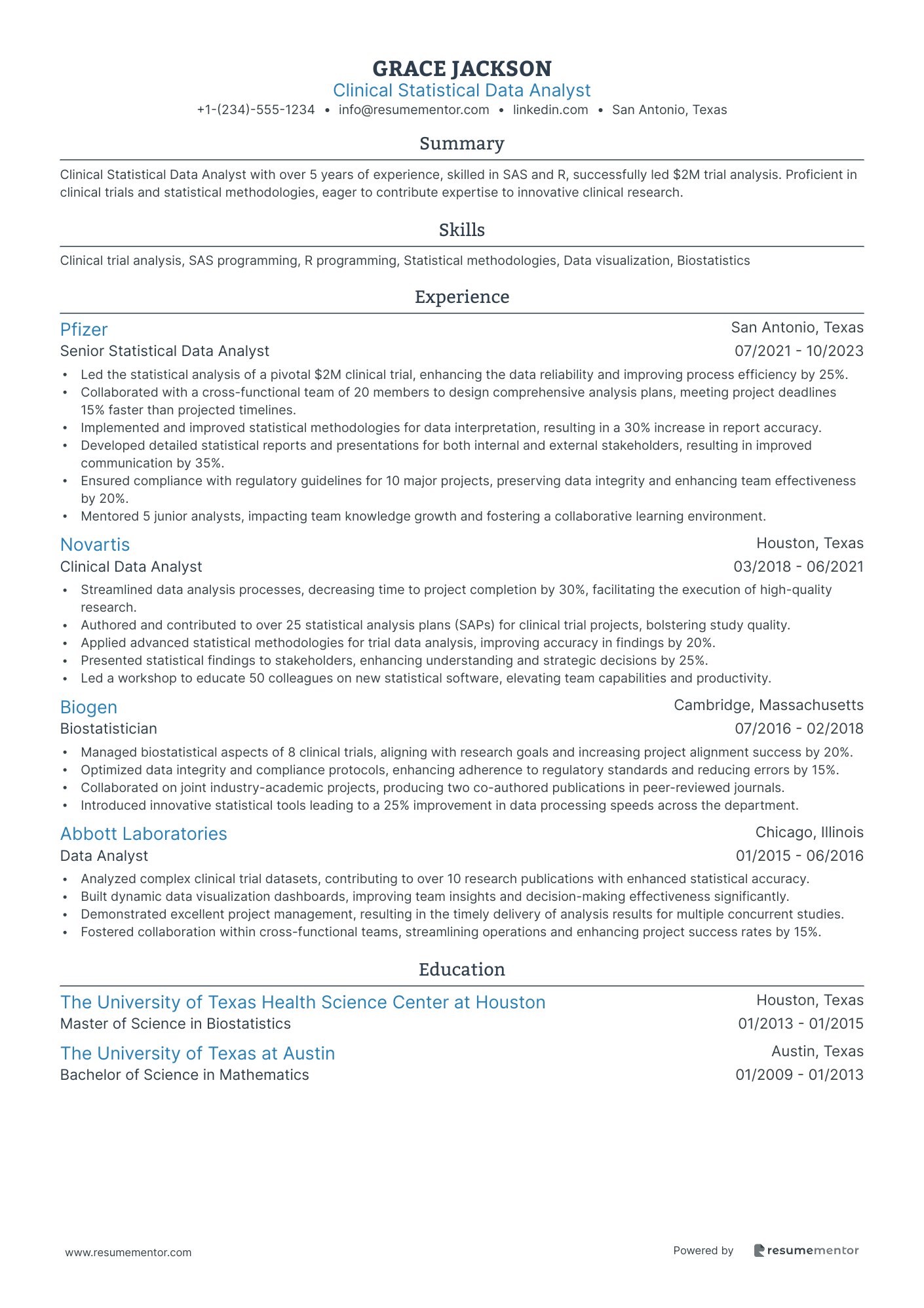
Clinical Statistical Data Analyst
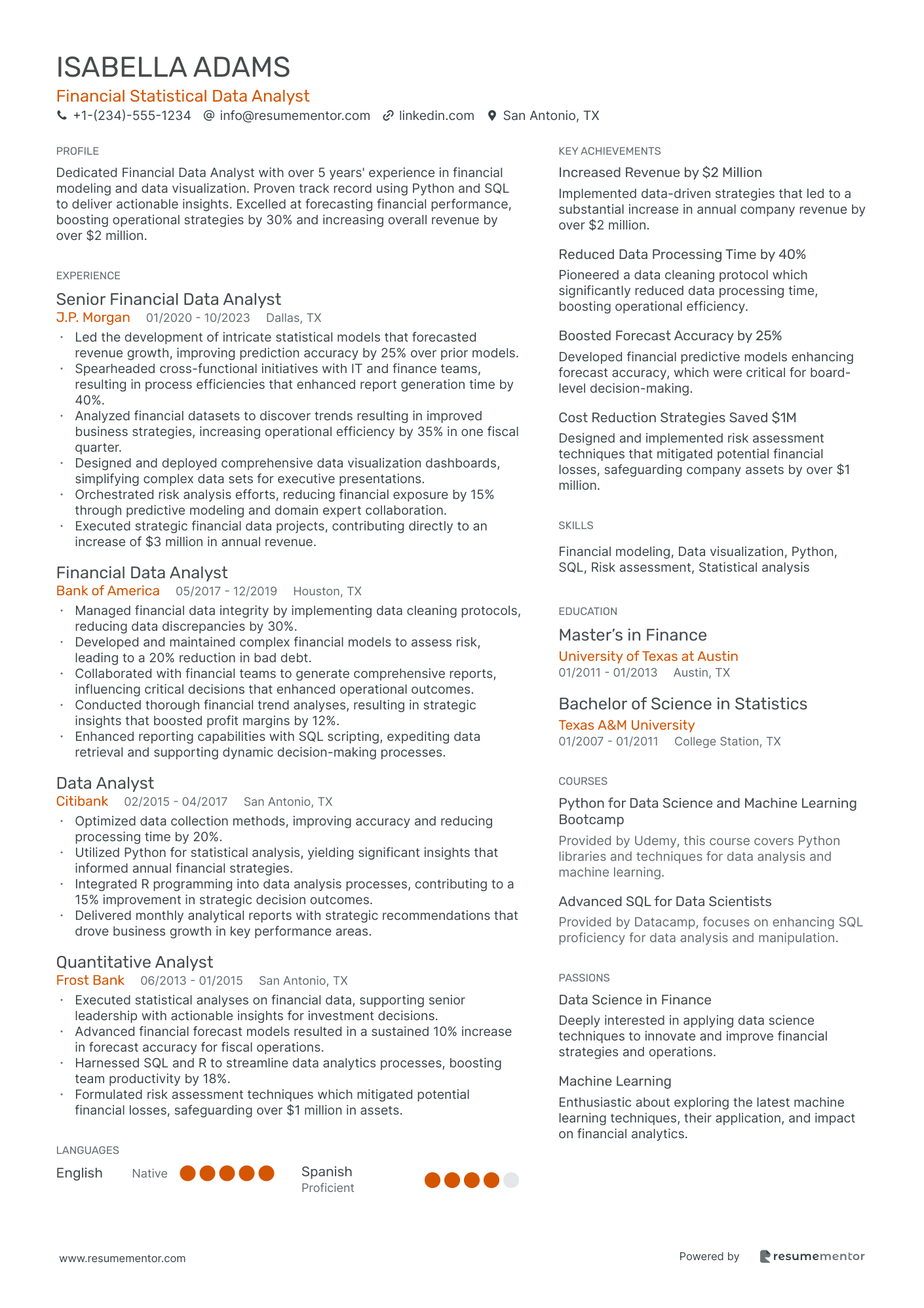
Financial Statistical Data Analyst
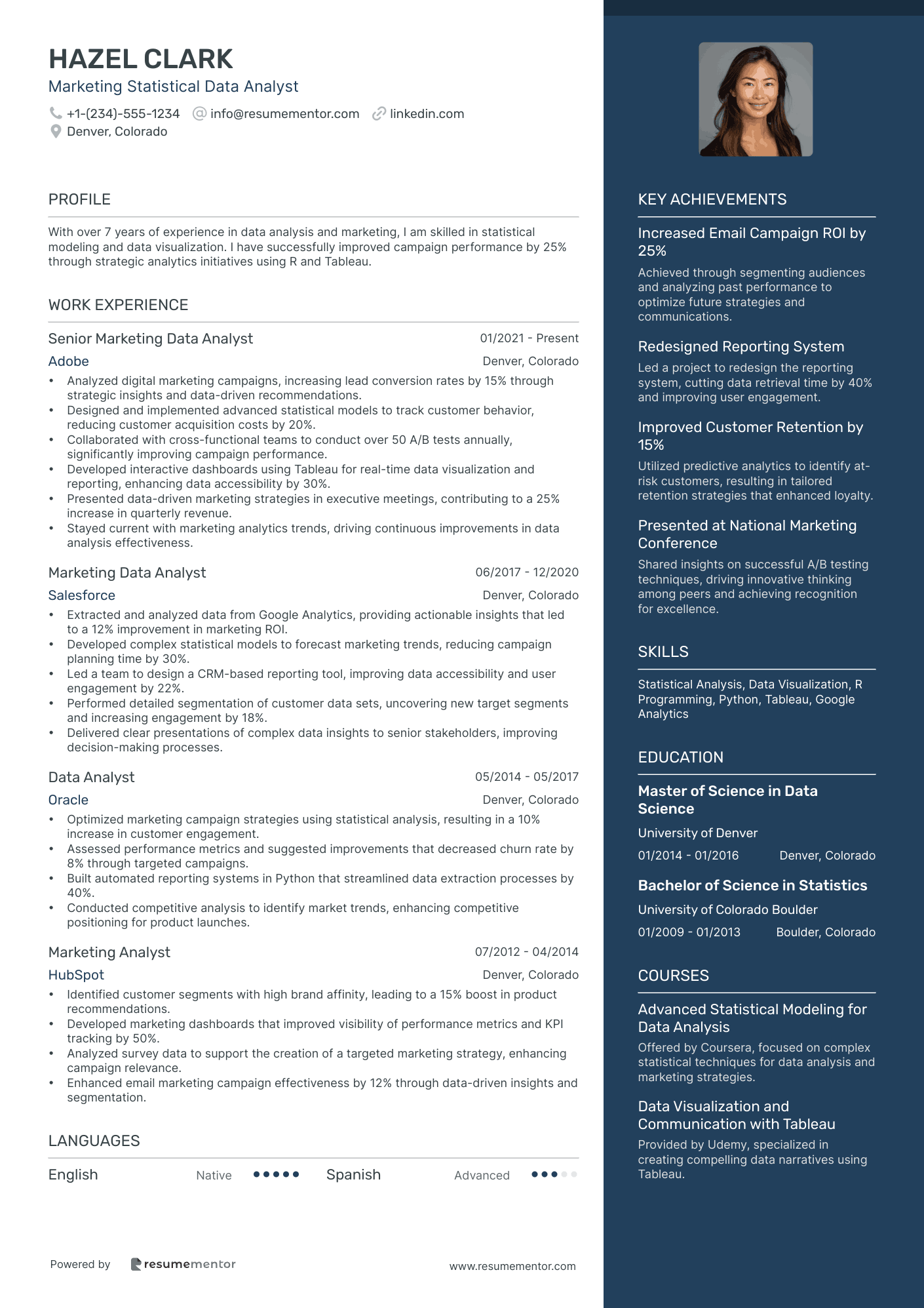
Marketing Statistical Data Analyst
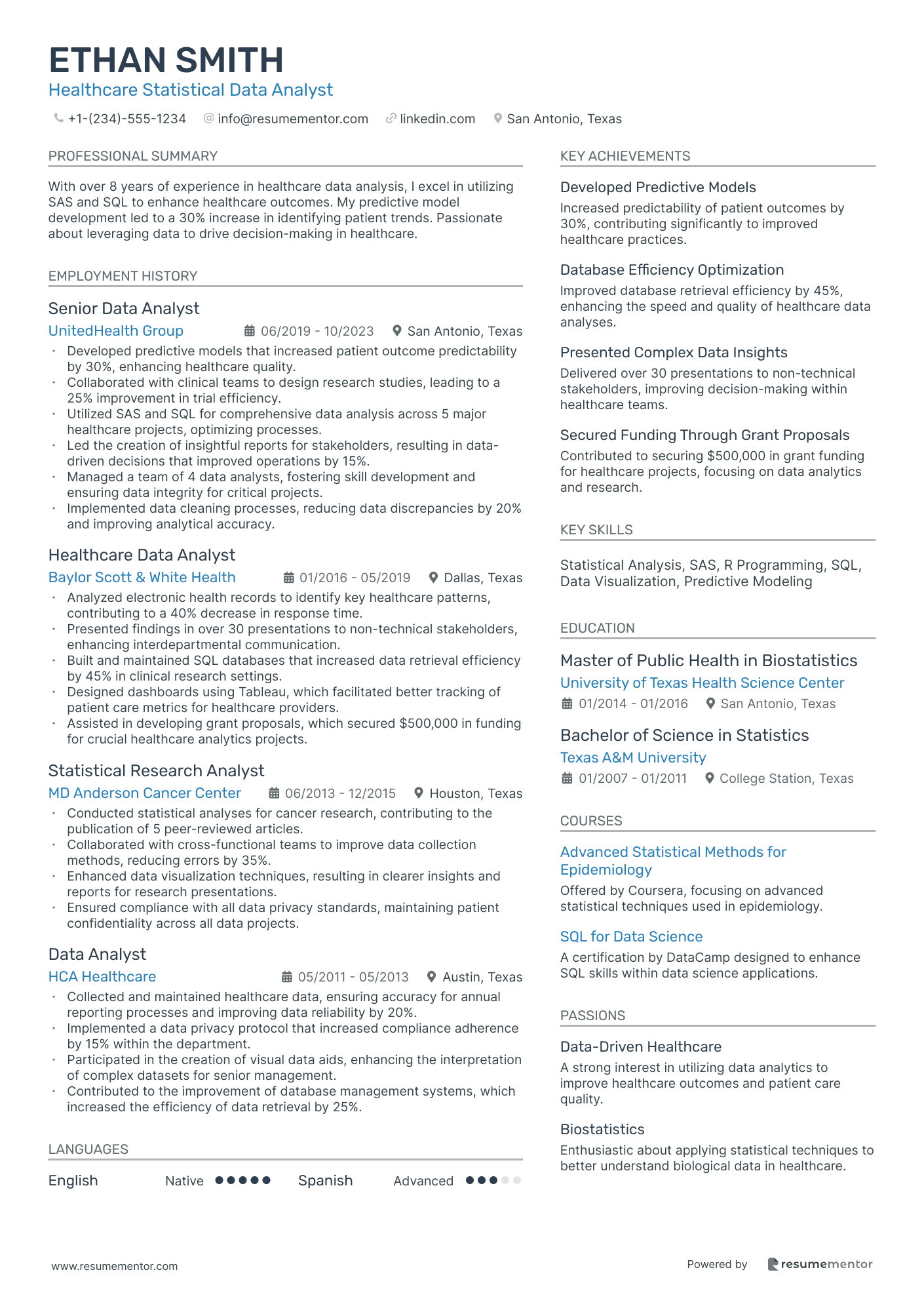
Healthcare Statistical Data Analyst
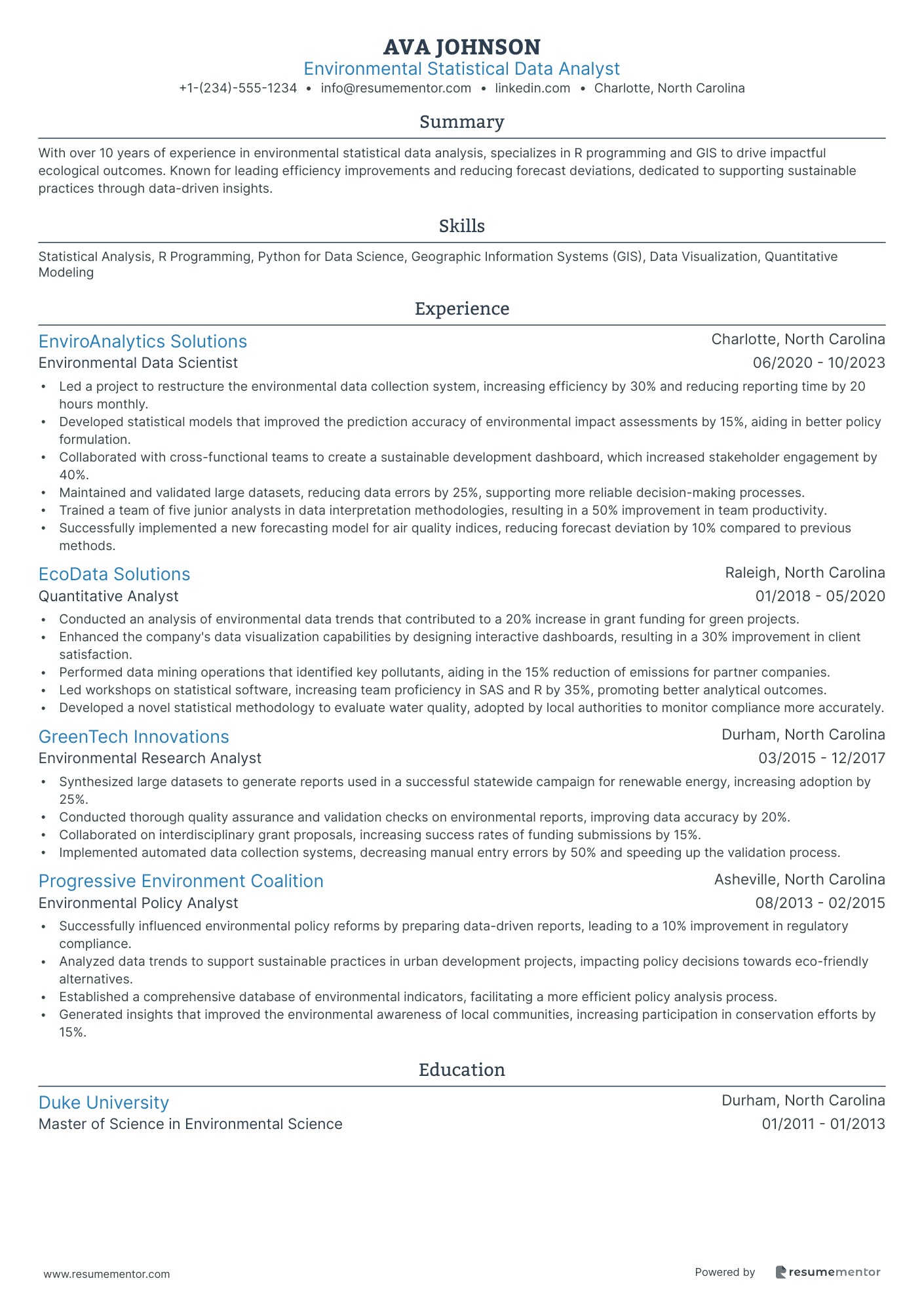
Environmental Statistical Data Analyst
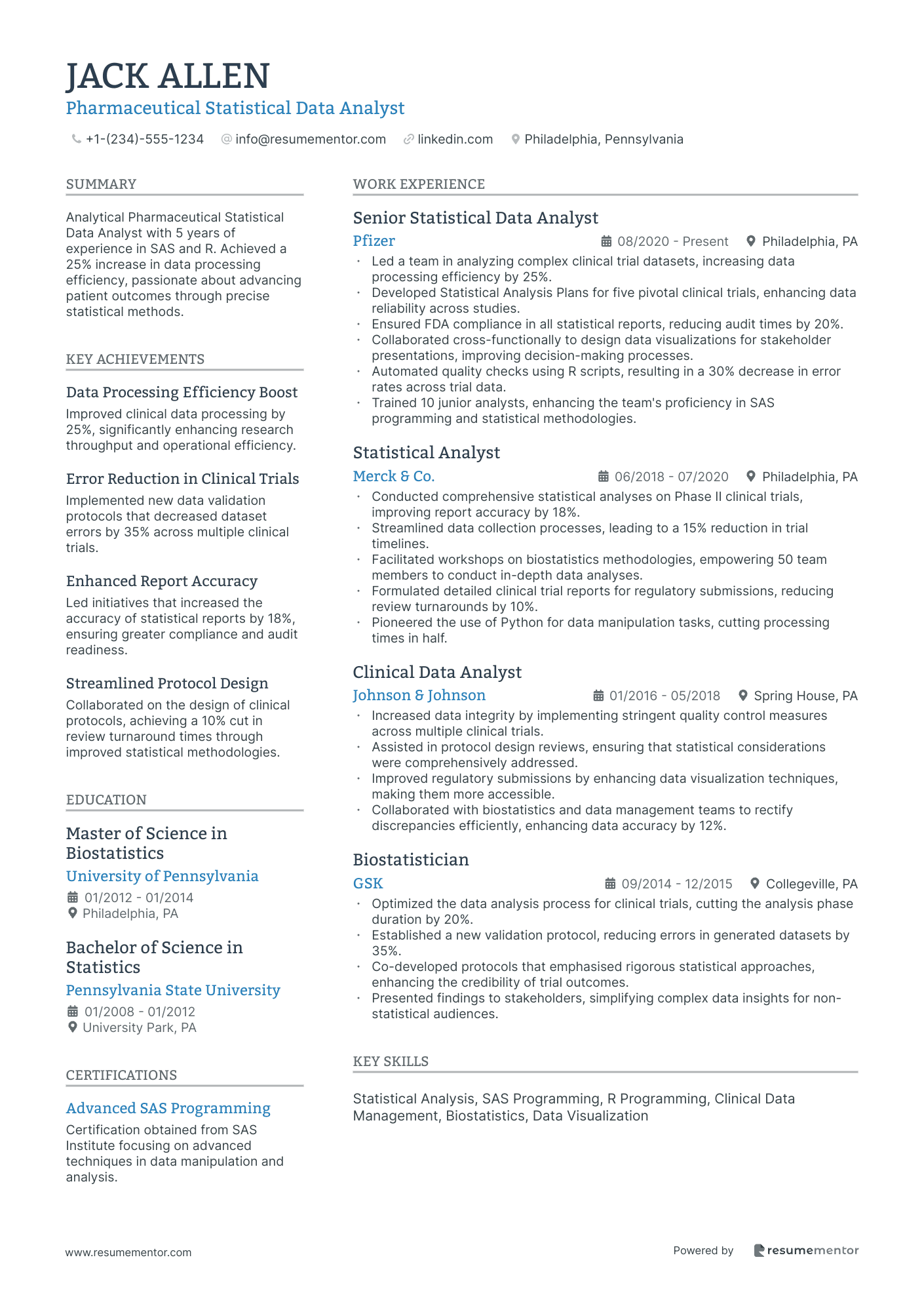
Pharmaceutical Statistical Data Analyst
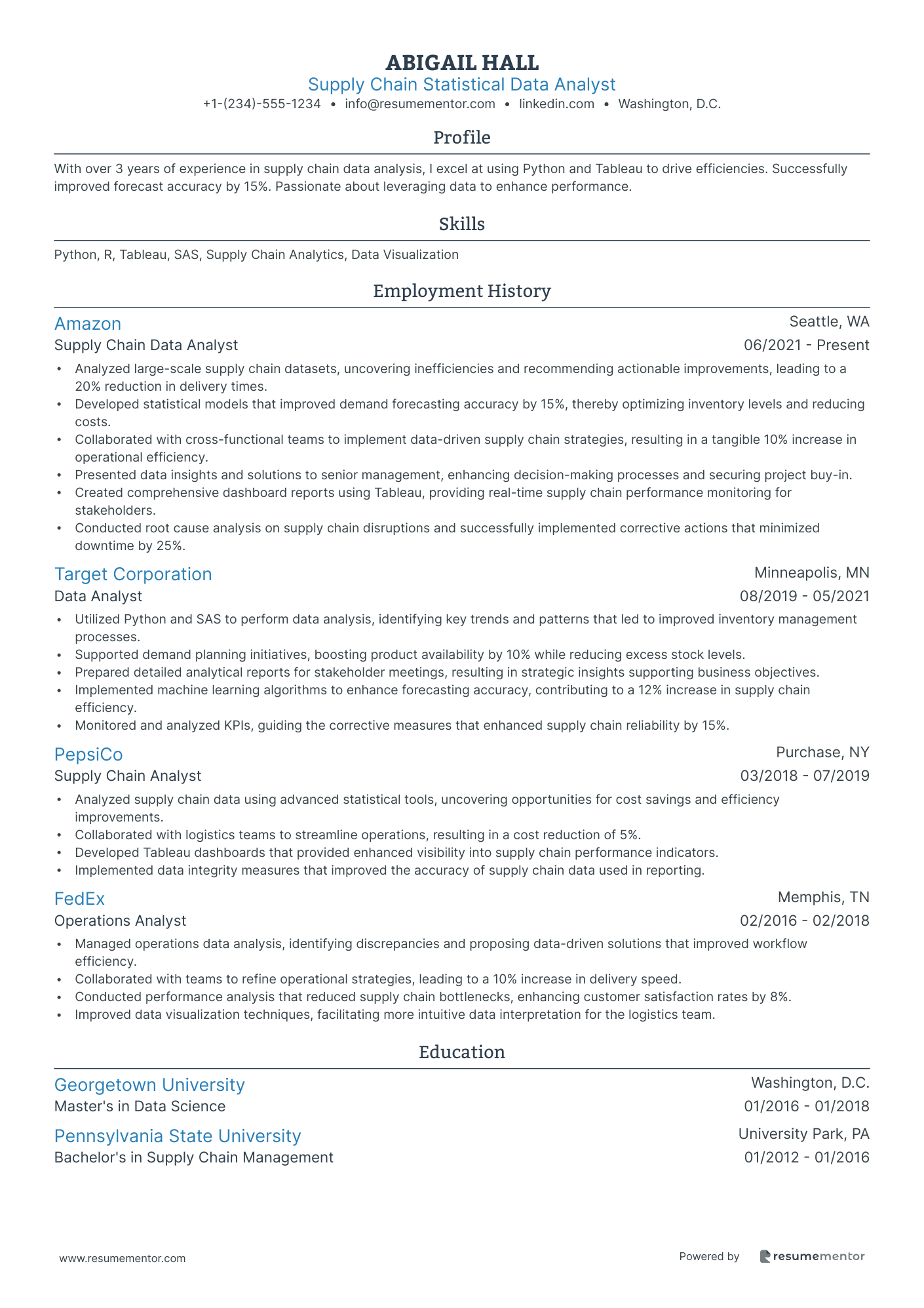
Supply Chain Statistical Data Analyst
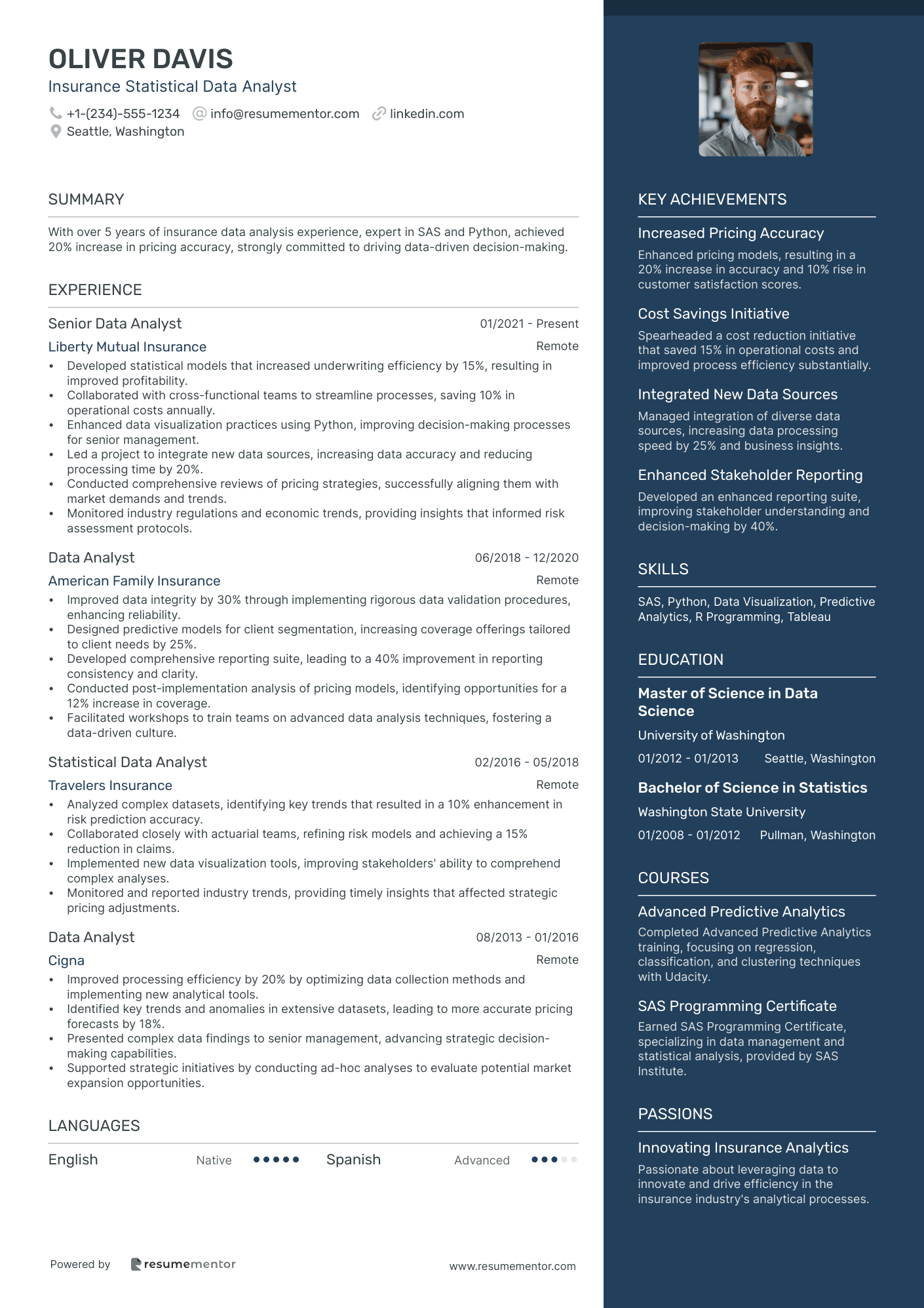
Insurance Statistical Data Analyst
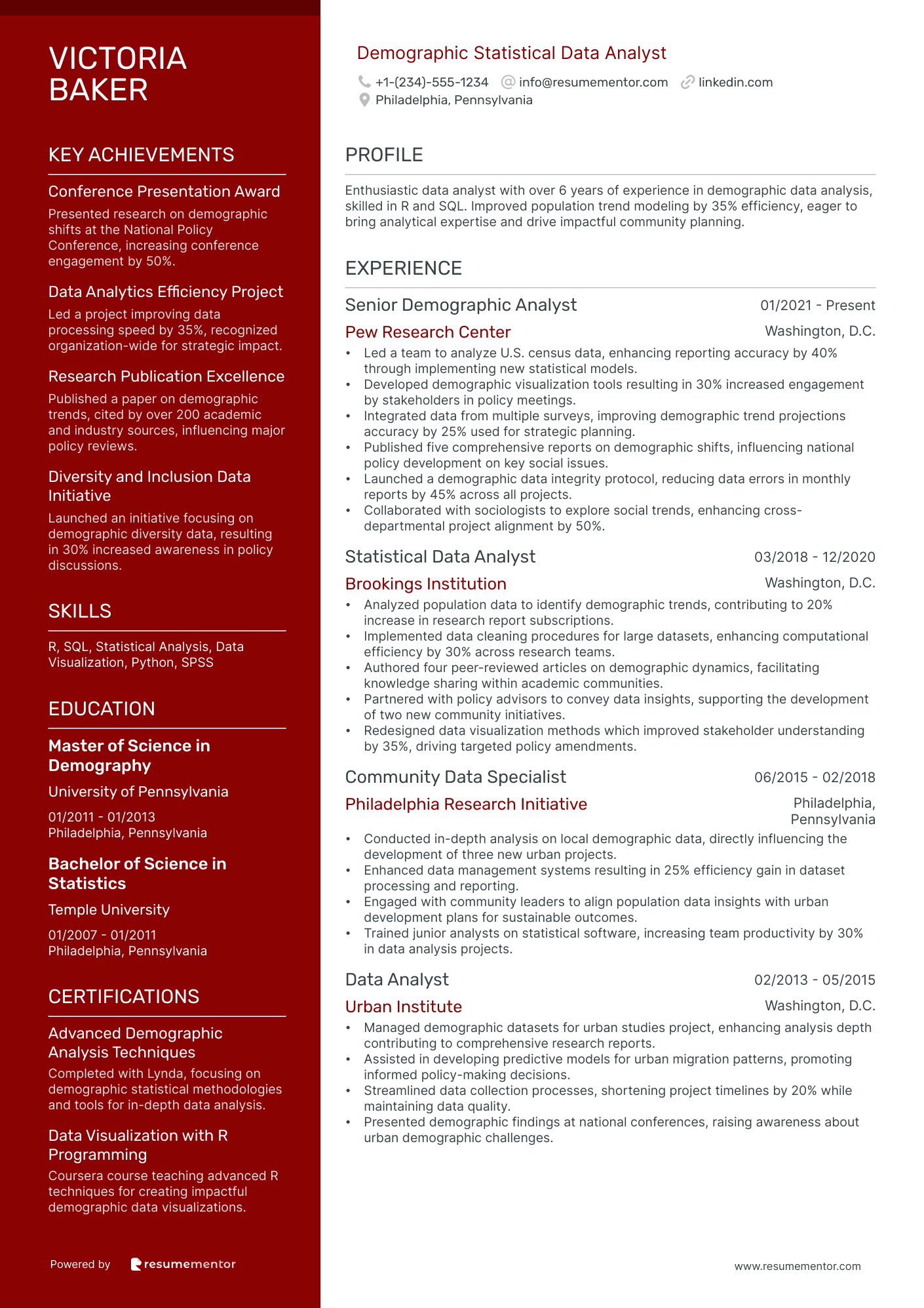
Demographic Statistical Data Analyst
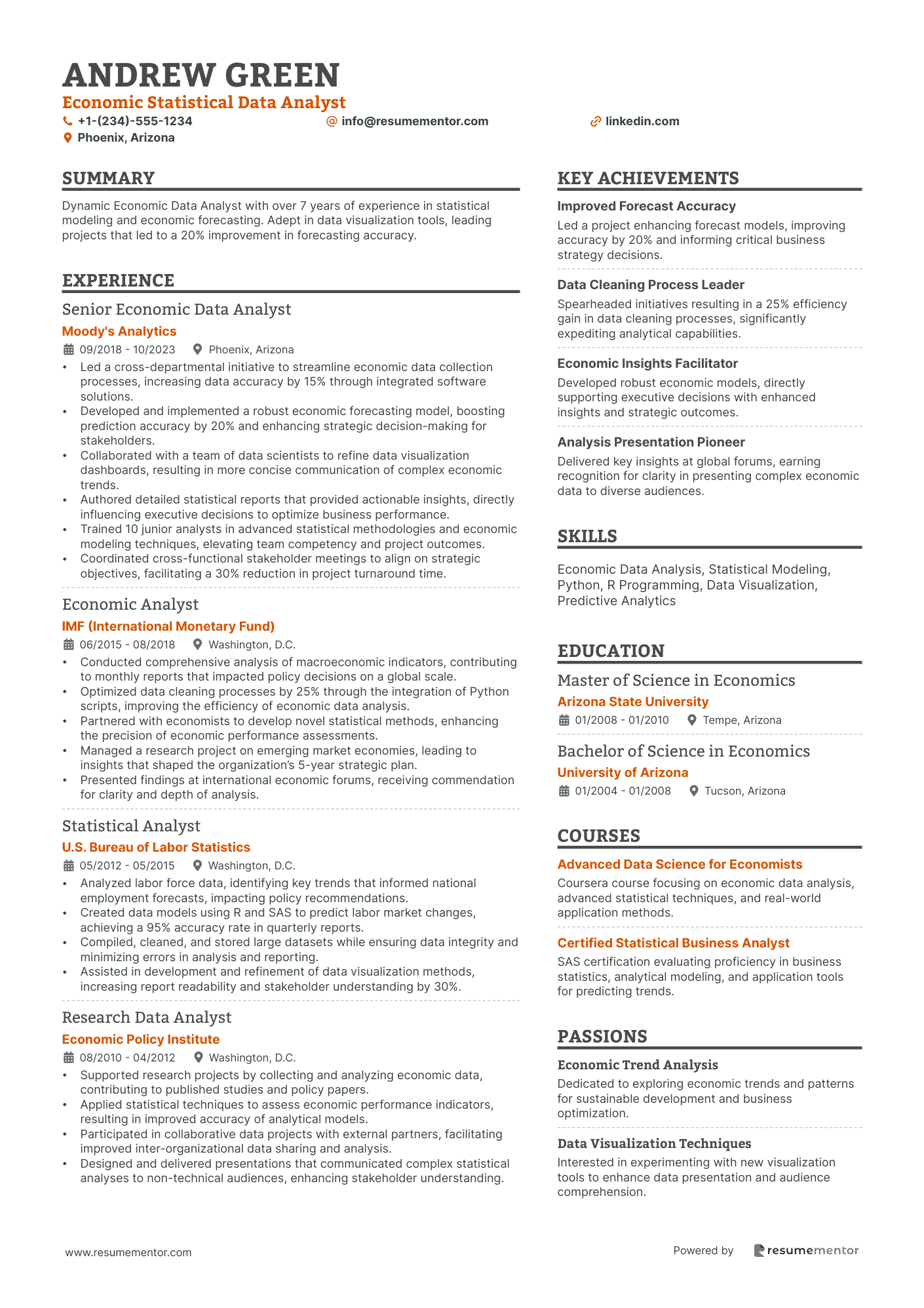
Economic Statistical Data Analyst

Clinical Statistical Data Analyst resume sample
- •Led the statistical analysis of a pivotal $2M clinical trial, enhancing the data reliability and improving process efficiency by 25%.
- •Collaborated with a cross-functional team of 20 members to design comprehensive analysis plans, meeting project deadlines 15% faster than projected timelines.
- •Implemented and improved statistical methodologies for data interpretation, resulting in a 30% increase in report accuracy.
- •Developed detailed statistical reports and presentations for both internal and external stakeholders, resulting in improved communication by 35%.
- •Ensured compliance with regulatory guidelines for 10 major projects, preserving data integrity and enhancing team effectiveness by 20%.
- •Mentored 5 junior analysts, impacting team knowledge growth and fostering a collaborative learning environment.
- •Streamlined data analysis processes, decreasing time to project completion by 30%, facilitating the execution of high-quality research.
- •Authored and contributed to over 25 statistical analysis plans (SAPs) for clinical trial projects, bolstering study quality.
- •Applied advanced statistical methodologies for trial data analysis, improving accuracy in findings by 20%.
- •Presented statistical findings to stakeholders, enhancing understanding and strategic decisions by 25%.
- •Led a workshop to educate 50 colleagues on new statistical software, elevating team capabilities and productivity.
- •Managed biostatistical aspects of 8 clinical trials, aligning with research goals and increasing project alignment success by 20%.
- •Optimized data integrity and compliance protocols, enhancing adherence to regulatory standards and reducing errors by 15%.
- •Collaborated on joint industry-academic projects, producing two co-authored publications in peer-reviewed journals.
- •Introduced innovative statistical tools leading to a 25% improvement in data processing speeds across the department.
- •Analyzed complex clinical trial datasets, contributing to over 10 research publications with enhanced statistical accuracy.
- •Built dynamic data visualization dashboards, improving team insights and decision-making effectiveness significantly.
- •Demonstrated excellent project management, resulting in the timely delivery of analysis results for multiple concurrent studies.
- •Fostered collaboration within cross-functional teams, streamlining operations and enhancing project success rates by 15%.
Financial Statistical Data Analyst resume sample
- •Led the development of intricate statistical models that forecasted revenue growth, improving prediction accuracy by 25% over prior models.
- •Spearheaded cross-functional initiatives with IT and finance teams, resulting in process efficiencies that enhanced report generation time by 40%.
- •Analyzed financial datasets to discover trends resulting in improved business strategies, increasing operational efficiency by 35% in one fiscal quarter.
- •Designed and deployed comprehensive data visualization dashboards, simplifying complex data sets for executive presentations.
- •Orchestrated risk analysis efforts, reducing financial exposure by 15% through predictive modeling and domain expert collaboration.
- •Executed strategic financial data projects, contributing directly to an increase of $3 million in annual revenue.
- •Managed financial data integrity by implementing data cleaning protocols, reducing data discrepancies by 30%.
- •Developed and maintained complex financial models to assess risk, leading to a 20% reduction in bad debt.
- •Collaborated with financial teams to generate comprehensive reports, influencing critical decisions that enhanced operational outcomes.
- •Conducted thorough financial trend analyses, resulting in strategic insights that boosted profit margins by 12%.
- •Enhanced reporting capabilities with SQL scripting, expediting data retrieval and supporting dynamic decision-making processes.
- •Optimized data collection methods, improving accuracy and reducing processing time by 20%.
- •Utilized Python for statistical analysis, yielding significant insights that informed annual financial strategies.
- •Integrated R programming into data analysis processes, contributing to a 15% improvement in strategic decision outcomes.
- •Delivered monthly analytical reports with strategic recommendations that drove business growth in key performance areas.
- •Executed statistical analyses on financial data, supporting senior leadership with actionable insights for investment decisions.
- •Advanced financial forecast models resulted in a sustained 10% increase in forecast accuracy for fiscal operations.
- •Harnessed SQL and R to streamline data analytics processes, boosting team productivity by 18%.
- •Formulated risk assessment techniques which mitigated potential financial losses, safeguarding over $1 million in assets.
Marketing Statistical Data Analyst resume sample
- •Analyzed digital marketing campaigns, increasing lead conversion rates by 15% through strategic insights and data-driven recommendations.
- •Designed and implemented advanced statistical models to track customer behavior, reducing customer acquisition costs by 20%.
- •Collaborated with cross-functional teams to conduct over 50 A/B tests annually, significantly improving campaign performance.
- •Developed interactive dashboards using Tableau for real-time data visualization and reporting, enhancing data accessibility by 30%.
- •Presented data-driven marketing strategies in executive meetings, contributing to a 25% increase in quarterly revenue.
- •Stayed current with marketing analytics trends, driving continuous improvements in data analysis effectiveness.
- •Extracted and analyzed data from Google Analytics, providing actionable insights that led to a 12% improvement in marketing ROI.
- •Developed complex statistical models to forecast marketing trends, reducing campaign planning time by 30%.
- •Led a team to design a CRM-based reporting tool, improving data accessibility and user engagement by 22%.
- •Performed detailed segmentation of customer data sets, uncovering new target segments and increasing engagement by 18%.
- •Delivered clear presentations of complex data insights to senior stakeholders, improving decision-making processes.
- •Optimized marketing campaign strategies using statistical analysis, resulting in a 10% increase in customer engagement.
- •Assessed performance metrics and suggested improvements that decreased churn rate by 8% through targeted campaigns.
- •Built automated reporting systems in Python that streamlined data extraction processes by 40%.
- •Conducted competitive analysis to identify market trends, enhancing competitive positioning for product launches.
- •Identified customer segments with high brand affinity, leading to a 15% boost in product recommendations.
- •Developed marketing dashboards that improved visibility of performance metrics and KPI tracking by 50%.
- •Analyzed survey data to support the creation of a targeted marketing strategy, enhancing campaign relevance.
- •Enhanced email marketing campaign effectiveness by 12% through data-driven insights and segmentation.
Healthcare Statistical Data Analyst resume sample
- •Developed predictive models that increased patient outcome predictability by 30%, enhancing healthcare quality.
- •Collaborated with clinical teams to design research studies, leading to a 25% improvement in trial efficiency.
- •Utilized SAS and SQL for comprehensive data analysis across 5 major healthcare projects, optimizing processes.
- •Led the creation of insightful reports for stakeholders, resulting in data-driven decisions that improved operations by 15%.
- •Managed a team of 4 data analysts, fostering skill development and ensuring data integrity for critical projects.
- •Implemented data cleaning processes, reducing data discrepancies by 20% and improving analytical accuracy.
- •Analyzed electronic health records to identify key healthcare patterns, contributing to a 40% decrease in response time.
- •Presented findings in over 30 presentations to non-technical stakeholders, enhancing interdepartmental communication.
- •Built and maintained SQL databases that increased data retrieval efficiency by 45% in clinical research settings.
- •Designed dashboards using Tableau, which facilitated better tracking of patient care metrics for healthcare providers.
- •Assisted in developing grant proposals, which secured $500,000 in funding for crucial healthcare analytics projects.
- •Conducted statistical analyses for cancer research, contributing to the publication of 5 peer-reviewed articles.
- •Collaborated with cross-functional teams to improve data collection methods, reducing errors by 35%.
- •Enhanced data visualization techniques, resulting in clearer insights and reports for research presentations.
- •Ensured compliance with all data privacy standards, maintaining patient confidentiality across all data projects.
- •Collected and maintained healthcare data, ensuring accuracy for annual reporting processes and improving data reliability by 20%.
- •Implemented a data privacy protocol that increased compliance adherence by 15% within the department.
- •Participated in the creation of visual data aids, enhancing the interpretation of complex datasets for senior management.
- •Contributed to the improvement of database management systems, which increased the efficiency of data retrieval by 25%.
Environmental Statistical Data Analyst resume sample
- •Led a project to restructure the environmental data collection system, increasing efficiency by 30% and reducing reporting time by 20 hours monthly.
- •Developed statistical models that improved the prediction accuracy of environmental impact assessments by 15%, aiding in better policy formulation.
- •Collaborated with cross-functional teams to create a sustainable development dashboard, which increased stakeholder engagement by 40%.
- •Maintained and validated large datasets, reducing data errors by 25%, supporting more reliable decision-making processes.
- •Trained a team of five junior analysts in data interpretation methodologies, resulting in a 50% improvement in team productivity.
- •Successfully implemented a new forecasting model for air quality indices, reducing forecast deviation by 10% compared to previous methods.
- •Conducted an analysis of environmental data trends that contributed to a 20% increase in grant funding for green projects.
- •Enhanced the company's data visualization capabilities by designing interactive dashboards, resulting in a 30% improvement in client satisfaction.
- •Performed data mining operations that identified key pollutants, aiding in the 15% reduction of emissions for partner companies.
- •Led workshops on statistical software, increasing team proficiency in SAS and R by 35%, promoting better analytical outcomes.
- •Developed a novel statistical methodology to evaluate water quality, adopted by local authorities to monitor compliance more accurately.
- •Synthesized large datasets to generate reports used in a successful statewide campaign for renewable energy, increasing adoption by 25%.
- •Conducted thorough quality assurance and validation checks on environmental reports, improving data accuracy by 20%.
- •Collaborated on interdisciplinary grant proposals, increasing success rates of funding submissions by 15%.
- •Implemented automated data collection systems, decreasing manual entry errors by 50% and speeding up the validation process.
- •Successfully influenced environmental policy reforms by preparing data-driven reports, leading to a 10% improvement in regulatory compliance.
- •Analyzed data trends to support sustainable practices in urban development projects, impacting policy decisions towards eco-friendly alternatives.
- •Established a comprehensive database of environmental indicators, facilitating a more efficient policy analysis process.
- •Generated insights that improved the environmental awareness of local communities, increasing participation in conservation efforts by 15%.
Pharmaceutical Statistical Data Analyst resume sample
- •Led a team in analyzing complex clinical trial datasets, increasing data processing efficiency by 25%.
- •Developed Statistical Analysis Plans for five pivotal clinical trials, enhancing data reliability across studies.
- •Ensured FDA compliance in all statistical reports, reducing audit times by 20%.
- •Collaborated cross-functionally to design data visualizations for stakeholder presentations, improving decision-making processes.
- •Automated quality checks using R scripts, resulting in a 30% decrease in error rates across trial data.
- •Trained 10 junior analysts, enhancing the team's proficiency in SAS programming and statistical methodologies.
- •Conducted comprehensive statistical analyses on Phase II clinical trials, improving report accuracy by 18%.
- •Streamlined data collection processes, leading to a 15% reduction in trial timelines.
- •Facilitated workshops on biostatistics methodologies, empowering 50 team members to conduct in-depth data analyses.
- •Formulated detailed clinical trial reports for regulatory submissions, reducing review turnarounds by 10%.
- •Pioneered the use of Python for data manipulation tasks, cutting processing times in half.
- •Increased data integrity by implementing stringent quality control measures across multiple clinical trials.
- •Assisted in protocol design reviews, ensuring that statistical considerations were comprehensively addressed.
- •Improved regulatory submissions by enhancing data visualization techniques, making them more accessible.
- •Collaborated with biostatistics and data management teams to rectify discrepancies efficiently, enhancing data accuracy by 12%.
- •Optimized the data analysis process for clinical trials, cutting the analysis phase duration by 20%.
- •Established a new validation protocol, reducing errors in generated datasets by 35%.
- •Co-developed protocols that emphasised rigorous statistical approaches, enhancing the credibility of trial outcomes.
- •Presented findings to stakeholders, simplifying complex data insights for non-statistical audiences.
Supply Chain Statistical Data Analyst resume sample
- •Analyzed large-scale supply chain datasets, uncovering inefficiencies and recommending actionable improvements, leading to a 20% reduction in delivery times.
- •Developed statistical models that improved demand forecasting accuracy by 15%, thereby optimizing inventory levels and reducing costs.
- •Collaborated with cross-functional teams to implement data-driven supply chain strategies, resulting in a tangible 10% increase in operational efficiency.
- •Presented data insights and solutions to senior management, enhancing decision-making processes and securing project buy-in.
- •Created comprehensive dashboard reports using Tableau, providing real-time supply chain performance monitoring for stakeholders.
- •Conducted root cause analysis on supply chain disruptions and successfully implemented corrective actions that minimized downtime by 25%.
- •Utilized Python and SAS to perform data analysis, identifying key trends and patterns that led to improved inventory management processes.
- •Supported demand planning initiatives, boosting product availability by 10% while reducing excess stock levels.
- •Prepared detailed analytical reports for stakeholder meetings, resulting in strategic insights supporting business objectives.
- •Implemented machine learning algorithms to enhance forecasting accuracy, contributing to a 12% increase in supply chain efficiency.
- •Monitored and analyzed KPIs, guiding the corrective measures that enhanced supply chain reliability by 15%.
- •Analyzed supply chain data using advanced statistical tools, uncovering opportunities for cost savings and efficiency improvements.
- •Collaborated with logistics teams to streamline operations, resulting in a cost reduction of 5%.
- •Developed Tableau dashboards that provided enhanced visibility into supply chain performance indicators.
- •Implemented data integrity measures that improved the accuracy of supply chain data used in reporting.
- •Managed operations data analysis, identifying discrepancies and proposing data-driven solutions that improved workflow efficiency.
- •Collaborated with teams to refine operational strategies, leading to a 10% increase in delivery speed.
- •Conducted performance analysis that reduced supply chain bottlenecks, enhancing customer satisfaction rates by 8%.
- •Improved data visualization techniques, facilitating more intuitive data interpretation for the logistics team.
Insurance Statistical Data Analyst resume sample
- •Developed statistical models that increased underwriting efficiency by 15%, resulting in improved profitability.
- •Collaborated with cross-functional teams to streamline processes, saving 10% in operational costs annually.
- •Enhanced data visualization practices using Python, improving decision-making processes for senior management.
- •Led a project to integrate new data sources, increasing data accuracy and reducing processing time by 20%.
- •Conducted comprehensive reviews of pricing strategies, successfully aligning them with market demands and trends.
- •Monitored industry regulations and economic trends, providing insights that informed risk assessment protocols.
- •Improved data integrity by 30% through implementing rigorous data validation procedures, enhancing reliability.
- •Designed predictive models for client segmentation, increasing coverage offerings tailored to client needs by 25%.
- •Developed comprehensive reporting suite, leading to a 40% improvement in reporting consistency and clarity.
- •Conducted post-implementation analysis of pricing models, identifying opportunities for a 12% increase in coverage.
- •Facilitated workshops to train teams on advanced data analysis techniques, fostering a data-driven culture.
- •Analyzed complex datasets, identifying key trends that resulted in a 10% enhancement in risk prediction accuracy.
- •Collaborated closely with actuarial teams, refining risk models and achieving a 15% reduction in claims.
- •Implemented new data visualization tools, improving stakeholders' ability to comprehend complex analyses.
- •Monitored and reported industry trends, providing timely insights that affected strategic pricing adjustments.
- •Improved processing efficiency by 20% by optimizing data collection methods and implementing new analytical tools.
- •Identified key trends and anomalies in extensive datasets, leading to more accurate pricing forecasts by 18%.
- •Presented complex data findings to senior management, advancing strategic decision-making capabilities.
- •Supported strategic initiatives by conducting ad-hoc analyses to evaluate potential market expansion opportunities.
Demographic Statistical Data Analyst resume sample
- •Led a team to analyze U.S. census data, enhancing reporting accuracy by 40% through implementing new statistical models.
- •Developed demographic visualization tools resulting in 30% increased engagement by stakeholders in policy meetings.
- •Integrated data from multiple surveys, improving demographic trend projections accuracy by 25% used for strategic planning.
- •Published five comprehensive reports on demographic shifts, influencing national policy development on key social issues.
- •Launched a demographic data integrity protocol, reducing data errors in monthly reports by 45% across all projects.
- •Collaborated with sociologists to explore social trends, enhancing cross-departmental project alignment by 50%.
- •Analyzed population data to identify demographic trends, contributing to 20% increase in research report subscriptions.
- •Implemented data cleaning procedures for large datasets, enhancing computational efficiency by 30% across research teams.
- •Authored four peer-reviewed articles on demographic dynamics, facilitating knowledge sharing within academic communities.
- •Partnered with policy advisors to convey data insights, supporting the development of two new community initiatives.
- •Redesigned data visualization methods which improved stakeholder understanding by 35%, driving targeted policy amendments.
- •Conducted in-depth analysis on local demographic data, directly influencing the development of three new urban projects.
- •Enhanced data management systems resulting in 25% efficiency gain in dataset processing and reporting.
- •Engaged with community leaders to align population data insights with urban development plans for sustainable outcomes.
- •Trained junior analysts on statistical software, increasing team productivity by 30% in data analysis projects.
- •Managed demographic datasets for urban studies project, enhancing analysis depth contributing to comprehensive research reports.
- •Assisted in developing predictive models for urban migration patterns, promoting informed policy-making decisions.
- •Streamlined data collection processes, shortening project timelines by 20% while maintaining data quality.
- •Presented demographic findings at national conferences, raising awareness about urban demographic challenges.
Economic Statistical Data Analyst resume sample
- •Led a cross-departmental initiative to streamline economic data collection processes, increasing data accuracy by 15% through integrated software solutions.
- •Developed and implemented a robust economic forecasting model, boosting prediction accuracy by 20% and enhancing strategic decision-making for stakeholders.
- •Collaborated with a team of data scientists to refine data visualization dashboards, resulting in more concise communication of complex economic trends.
- •Authored detailed statistical reports that provided actionable insights, directly influencing executive decisions to optimize business performance.
- •Trained 10 junior analysts in advanced statistical methodologies and economic modeling techniques, elevating team competency and project outcomes.
- •Coordinated cross-functional stakeholder meetings to align on strategic objectives, facilitating a 30% reduction in project turnaround time.
- •Conducted comprehensive analysis of macroeconomic indicators, contributing to monthly reports that impacted policy decisions on a global scale.
- •Optimized data cleaning processes by 25% through the integration of Python scripts, improving the efficiency of economic data analysis.
- •Partnered with economists to develop novel statistical methods, enhancing the precision of economic performance assessments.
- •Managed a research project on emerging market economies, leading to insights that shaped the organization’s 5-year strategic plan.
- •Presented findings at international economic forums, receiving commendation for clarity and depth of analysis.
- •Analyzed labor force data, identifying key trends that informed national employment forecasts, impacting policy recommendations.
- •Created data models using R and SAS to predict labor market changes, achieving a 95% accuracy rate in quarterly reports.
- •Compiled, cleaned, and stored large datasets while ensuring data integrity and minimizing errors in analysis and reporting.
- •Assisted in development and refinement of data visualization methods, increasing report readability and stakeholder understanding by 30%.
- •Supported research projects by collecting and analyzing economic data, contributing to published studies and policy papers.
- •Applied statistical techniques to assess economic performance indicators, resulting in improved accuracy of analytical models.
- •Participated in collaborative data projects with external partners, facilitating improved inter-organizational data sharing and analysis.
- •Designed and delivered presentations that communicated complex statistical analyses to non-technical audiences, enhancing stakeholder understanding.
Creating a resume as a statistical data analyst can feel like piecing together a complex puzzle. Your ability to interpret large datasets is crucial, but capturing this skill on paper often feels daunting. The challenge lies in translating your analytical skills into words that resonate with employers. Finding the right way to showcase your worth on a resume can seem overwhelming.
That's where a structured approach, like using a resume template, becomes invaluable. These templates provide a clear framework, helping you organize your skills and experiences in a way that speaks directly to what employers are looking for. They allow you to effectively align your data expertise with the demands of a specific job. If you're unsure where to begin, take a look at these helpful resume templates.
A successful resume should do more than list skills and jobs—it's your personal marketing tool. It should showcase why you’re the ideal candidate, emphasizing your ability to transform raw data into meaningful insights. As demand for data skills rises across industries, highlighting this capability is crucial.
In this guide, we'll explore the common challenges you might face when writing your resume as a statistical data analyst. Learn how to succinctly convey your talents and turn complex data work into compelling points for hiring managers. Stick with us, and we’ll help you craft a job application that truly stands out.
Key Takeaways
- Choosing a resume template helps structure your skills and experiences effectively, aligning them with the specific job demands.
- Your resume acts as a personal marketing tool and should highlight your capability to turn data into meaningful insights, especially as demand for data skills increases.
- Employers prioritize resumes that demonstrate growth and expertise, so use a reverse-chronological format to showcase recent work experiences and skills upfront.
- Quantifying achievements in your experience section can strongly underline how your skills have contributed to past business successes.
- The education section should be tailored to match the job, highlighting relevant degrees and certifications to demonstrate your readiness for the role.
What to focus on when writing your statistical data analyst resume
Your statistical data analyst resume should be a clear reflection of your unique blend of skills and experience—this is your chance to present a compelling narrative about your career in data analytics.
How to structure your statistical data analyst resume
- Contact Information: This is the gateway to your professional identity—include your full name, phone number, email address, and LinkedIn profile. Double-check these for accuracy—recruiters need a reliable way to reach you. Listing your LinkedIn profile ensures they can see endorsements and recommendations that support your skills.
- Professional Summary: Your summary is the first impression—craft a snapshot that encapsulates your analytical skills, relevant experience, and areas of specialty such as predictive modeling or machine learning. This summary sets the stage, highlighting your career highlights and what you bring to the table.
- Technical Skills: This is where you underline your proficiency—list the statistical software you excel in, such as R, SAS, or Python, and the database systems you regularly employ, like SQL. Mentioning specific statistical techniques and tools like Tableau or Power BI really highlights your technical acumen.
- Work Experience: Your work experience is the heart of your resume—document your previous roles by focusing on achievements and the actual statistical methods used. If your analyses led to significant process improvements or profitability, quantify those impacts. This not only shows what you've done but also illustrates your contribution to overarching business goals.
- Education: Here, tie your academic background to your professional expertise—mention your degree(s) in statistics, mathematics, or related fields. Consider highlighting certifications relevant to data analysis or statistical methods, which attest to additional training or continued education in your field.
- Projects or Industry Experience: Use this section to showcase specific projects where your analysis led to key insights or notable results. Demonstrate how your skills transferred to real-world applications and contributed to project objectives—this highlights practical experience in action.
Now that you have an overview of how to build a compelling resume, let's delve deeper into each section, emphasizing their importance and how to maximize their impact in your overall resume format.
Which resume format to choose
For a statistical data analyst, choosing the right resume format is crucial. A reverse-chronological format lets you highlight your recent work experiences and key skills upfront, which is important because employers in data analysis want to see demonstrated expertise and progression in your field. This format naturally guides them through your career path, showing how you've grown in the industry.
When deciding on a font, opt for modern selections like Raleway, Montserrat, or Lato. These fonts complement the analytical nature of your work by providing a clean and organized visual appeal. They help your resume look contemporary without sacrificing readability, reflecting the precision and clarity that are crucial in data analysis.
Saving your resume as a PDF is a strategic choice. PDFs maintain the resume’s layout and formatting regardless of the device used to view it. This consistency mirrors the precision needed in data analysis where accuracy in presentation is vital, ensuring your information is clear and professional no matter where it's viewed.
Setting your resume margins to about one inch on all sides creates a balanced white space that enhances readability and helps cluttered information stand out. This subtle design choice indicates your ability to present complex data in a clear and accessible way, a key skill for any statistical data analyst.
Together, these elements fine-tune your resume to be a polished reflection of your analytical skills and attention to detail, essential qualities that potential employers are searching for in the field.
How to write a quantifiable resume experience section
When building the experience section of your statistical data analyst resume, it's important to merge your key achievements and roles into a cohesive narrative. Start with the most recent position and work backward, ensuring each role emphasizes your analytical strengths. This section should highlight how your skills have driven tangible positive outcomes. Typically, covering the last 10 years is enough unless older roles hold particular significance. Align your experiences with the job description, focusing on what the employer values most. Utilize strong action words like "analyzed," "developed," "improved," and "led" to bring your accomplishments to life. Consider this refined example:
- •Analyzed complex data sets, leading to a 30% boost in operational efficiency.
- •Developed predictive models which significantly improved customer segmentation accuracy by 25%.
- •Streamlined reporting systems, resulting in a 15% reduction in report generation time.
- •Led a cross-functional team project using advanced statistics, enhancing forecasting accuracy by 20%.
This experience section blends your achievements into a compelling story that highlights the impact of your data analysis expertise. Every sentence smoothly transitions into the next, showing how your analytical skills have consistently driven value. Using quantifiable metrics underscores your contributions and paints a clear picture of your influence in previous roles. Such seamless integration of your accomplishments aligns well with prospective job requirements, ensuring your proficiency stands out to potential employers.
Problem-Solving Focused resume experience section
A Problem-Solving Focused statistical data analyst resume experience section should clearly demonstrate your ability to tackle challenges and drive impactful results. Begin by outlining the specific issues you addressed and the tools or methods you employed to resolve them. Follow this up by showcasing any measurable successes, like improvements or efficiencies gained from your actions. Use strong action verbs to cohesively link your contributions throughout this journey, ensuring each sentence builds upon the previous one. Your ability to weave a narrative around problem-solving will make this section truly engaging.
It's important to show how your data analysis directly influenced business decisions and outcomes. Discuss scenarios where you translated complex findings to non-technical stakeholders, highlighting your skill in connecting data insights to actionable steps. By mentioning the diverse industries or environments you've navigated, emphasize how your solutions led to innovative processes or enhanced efficiencies. Together, your resume should narrate a cohesive story of growth, achievement, and resilience in overcoming obstacles.
Statistical Data Analyst
DataTech Solutions
June 2020 - May 2023
- Spotted and fixed data inconsistencies, which in turn boosted data accuracy by 15%.
- Created a predictive model that not only cut customer churn by 20% but also guided future strategies.
- Worked closely with product teams, using data insights to refine user interfaces and drive a 30% increase in engagement.
- Set up automated data dashboards, seamlessly reducing report preparation time by 50%, and streamlining decision-making.
Collaboration-Focused resume experience section
A collaboration-focused statistical data analyst resume experience section should effectively convey how you excel in team settings to drive meaningful results. Start by describing your experiences working with diverse teams to achieve shared goals, highlighting your ability to leverage collaboration for success. Share how you made complex data understandable to non-technical stakeholders, allowing them to make informed decisions. Focus on your role in developing data-driven solutions with team members, showcasing the benefits of combining expertise.
To enhance your resume's impact, use clear bullet points that illustrate your collaborative achievements with tangible outcomes. Demonstrating measurable results of teamwork adds depth and context to your contributions. This approach highlights not only your technical skills but also your ability to work well with others. Finish by ensuring your resume clearly portrays your essential role in collaborative successes and is polished for clarity and impact.
Statistical Data Analyst
Tech Innovations Inc.
January 2020 - Present
- Worked with a team of 5 analysts to develop a predictive model that increased sales forecasting accuracy by 15%.
- Facilitated workshops with marketing and product teams to align data strategies, boosting project completion rate by 20%.
- Translated complex statistical findings into actionable insights for stakeholders, leading to a 10% improvement in customer retention.
- Collaborated with IT team to implement a new data processing system, reducing data retrieval time by 30%.
Project-Focused resume experience section
A project-focused statistical data analyst resume experience section should clearly convey the impact of your work on significant projects. Start by highlighting projects where you applied your analytical skills to drive meaningful results. Clearly define your role, the tools you used, and the outcomes achieved to create a vivid picture of your contributions. This approach not only showcases your expertise but also demonstrates your value to potential employers.
Ensure your descriptions are both concise and informative by focusing on quantifiable achievements that highlight your proficiency with data analysis technologies and techniques. Use active language to detail your specific tasks and the tools you utilized, creating a narrative that links your efforts to measurable improvements. By emphasizing how you contributed to your team's success, you make your experience resonate more strongly with readers.
Data Analyst
Tech Solutions Inc.
June 2020 - Present
- Led a team to develop a predictive model that boosted sales forecasting accuracy by 15%, showcasing leadership and technical prowess.
- Cleaned and preprocessed data using Python, significantly reducing inaccuracies by 20% and streamlining subsequent analysis.
- Teamed up with colleagues to identify important business metrics, thereby enhancing data-driven decisions by 10% through effective collaboration.
- Created dashboards with Tableau, transforming data visualization and making insights more accessible and engaging for stakeholders.
Customer-Focused resume experience section
A customer-focused statistical data analyst resume experience section should highlight your impact on customer satisfaction through effective data analysis. Start by clearly stating your past roles and focus on success stories that demonstrate how your analytics skills drove significant decisions. Detail the projects you managed, the techniques you applied, and the outcomes achieved, emphasizing how these efforts led to improved customer experiences, better product offerings, or enhanced business efficiency.
Incorporate bullet points to outline your key achievements, ensuring they reflect your analytical expertise in addressing customer needs. Each bullet should flow logically, connecting how one success leads to another, and should be both actionable and measurable. This approach emphasizes your influence not only in data analysis but also in driving positive outcomes for customers.
Data Analyst
Tech Solutions Inc.
June 2020 - September 2023
- Spearheaded a project analyzing customer feedback data, which reduced complaint response time by 30% and led to improved customer retention.
- Developed predictive models that enhanced product recommendation accuracy by 20%, significantly boosting customer satisfaction scores.
- Collaborated with the marketing team to refine our customer segmentation strategy, which resulted in a 15% increase in targeted campaign success rates.
- Designed and implemented a real-time dashboard for monitoring customer sentiment, allowing the team to resolve issues proactively and strengthen customer relationships.
Write your statistical data analyst resume summary section
A results-focused statistical data analyst resume summary should capture an employer's attention quickly, acting as your elevator pitch. In just a few focused sentences, you should present your core strengths and achievements. Tailoring this section to highlight relevant experience and skills is key. Highlight specific achievements, like boosting efficiency or enhancing decision-making, to demonstrate your problem-solving abilities. Employers look for concrete examples that show how you’ve translated complex data into valuable insights, making it crucial to share results-driven stories.
Finding the right balance in tone is important—being confident but not boastful helps. Express your proficiency with industry-standard statistical software or programming languages. Phrases like "thrives on uncovering data trends" can make you memorable and set you apart. Aligning your resume summary with specific job requirements ensures you highlight how your unique talents make you the best fit for the role.
Understanding the nuances between a resume summary and other components like a resume objective, profile, or qualifications summary is essential in presenting the right message. A summary focuses on your career highlights and primary skills, making it ideal if you’ve got significant experience. Consider this example for a seasoned data analyst:
For those new to the industry or considering a career shift, a resume objective might be more suitable. It showcases your career goals and how they align with your prospective job. Choosing between a summary and an objective should depend on your experience and career trajectory, ensuring your resume piques interest and invites further exploration of your credentials.
Listing your statistical data analyst skills on your resume
A skills-focused statistical data analyst resume should effectively showcase your expertise by strategically laying out your abilities. Your skills can be highlighted in a standalone section or interwoven into your experience or summary sections. While your strengths and soft skills reveal your ability to collaborate and adapt, hard skills are all about the technical expertise necessary for this role, such as proficiency in specific software and analytical techniques.
The keywords you choose from your skills and strengths can play a crucial role in catching the attention of both employers and applicant tracking systems. By thoughtfully incorporating the right skills, your resume becomes a powerful tool to demonstrate why you are a fit for the positions you seek.
Here is an example of a standalone skills section crafted to catch eyes:
This skills section highlights key technical skills relevant to statistical data analysis efficiently and clearly, showcasing your capabilities and making a compelling case to employers.
Best hard skills to feature on your statistical data analyst resume
A statistical data analyst should have hard skills that convey your technical expertise, demonstrating your ability to handle complex data tasks. These skills highlight your talent in data analysis, model building, and software proficiency.
Hard Skills
- Data Analysis
- Statistical Modeling
- SQL
- Excel
- Python
- R Programming
- Data Visualization
- Machine Learning
- Predictive Analytics
- Data Mining
- SAS
- SPSS
- Big Data Analytics
- Tableau
- Data Cleaning
Best soft skills to feature on your statistical data analyst resume
Soft skills reveal your aptitude for communicating findings, solving problems, and collaborating with teams. These abilities show your capacity to thrive in varied work environments and create significant insights.
Soft Skills
- Attention to Detail
- Critical Thinking
- Communication
- Problem Solving
- Teamwork
- Time Management
- Adaptability
- Creativity
- Initiative
- Interpersonal Skills
- Organization
- Strategic Thinking
- Accountability
- Patience
- Conflict Resolution
How to include your education on your resume
The education section is a crucial part of your statistical data analyst resume, showcasing your academic background and proving your qualifications for the job. Tailor this section to match the specific position you are applying for, ensuring that only relevant educational experiences are included. If a particular degree or certification doesn't align with the role, it's best to leave it out. Including your GPA can be beneficial if it's above 3.0. When listing honors like cum laude, you can add it directly after your degree title. Clearly state your degree along with your major, institution, and graduation date to provide a complete picture. To effectively illustrate these points, let's examine both a wrong and a right example of an education section.
The second example stands out as it presents education that is directly applicable to a statistical data analyst role. It includes a clear statement of the degree, institution, and honors received, highlighting academic achievement. The high GPAs demonstrate strong academic performance, strengthening the candidate's credentials. This level of detail makes it a compelling education section for an employer seeking a capable statistical data analyst.
How to include statistical data analyst certificates on your resume
Including a certificates section in your resume as a statistical data analyst is crucial. This section highlights your specialized skills and qualifications. Place it prominently, such as in the header, to grab the recruiter's attention immediately.
List the name of each certificate clearly. Include the date you received the certificate for context. Add the issuing organization to validate its authenticity. Highlight certifications relevant to your field, such as data analysis or statistical software proficiency.
For example, in the header, you could write: "Certified SAS Specialist, IBM Certified Data Scientist." This instantly tells the recruiter about your credentials.
This example is strong because it includes relevant certifications from recognized institutions, which adds credibility. It is also concise and directly related to skills important for a statistical data analyst role. Using well-known certifiers ensures the recruiter understands your qualifications. This helps you stand out in a competitive job market.
Extra sections to include in your statistical data analyst resume
Crafting a well-rounded resume for a statistical data analyst involves more than just listing your technical skills and professional experience. Including diverse sections such as languages, hobbies and interests, volunteer work, and books can significantly enrich your resume, showing that you are a multi-faceted individual.
- Language section — List any languages you speak fluently, as this can highlight your communication skills and ability to engage with diverse teams.
- Hobbies and interests section — Mentioning your hobbies can give hiring managers insight into your personality and potential workplace culture fit.
- Volunteer work section — Detail any relevant volunteer experiences to demonstrate your willingness to contribute and your ability to bring positive change outside the workplace.
- Books section — Listing books you have read relevant to your field can show your commitment to continuous learning and professional development.
Incorporating these sections could make your resume stand out by showcasing a fuller picture of who you are as a candidate. This approach helps to portray a balance between professional expertise and personal qualities.
In Conclusion
In conclusion, creating a successful resume as a statistical data analyst requires careful attention to detail and a clear presentation of your skills and experiences. By using a structured template, you can effectively showcase your unique blend of analytical capabilities and professional achievements. Emphasizing both technical skills and soft skills on your resume will help you stand out to potential employers. It's important to tailor your resume to the specific job you are applying for, focusing on the skills and experiences most relevant to the position. Quantifiable achievements in your past roles can provide concrete evidence of your impact, making your resume more compelling to hiring managers. Remember to highlight your educational background and any relevant certifications to further establish your qualifications. Including additional sections such as languages, volunteer work, and hobbies can provide a well-rounded view of who you are as a candidate. Ultimately, a carefully crafted resume serves not just as a job application but as a personal marketing tool, showcasing your suitability for the role in a competitive job market. By presenting your data expertise in a clear and engaging manner, you can make a lasting impression on recruiters and strengthen your chances of landing the job you desire.
Related Articles

Continue Reading
Check more recommended readings to get the job of your dreams.
Resume
Resources
Tools
© 2026. All rights reserved.
Made with love by people who care.

